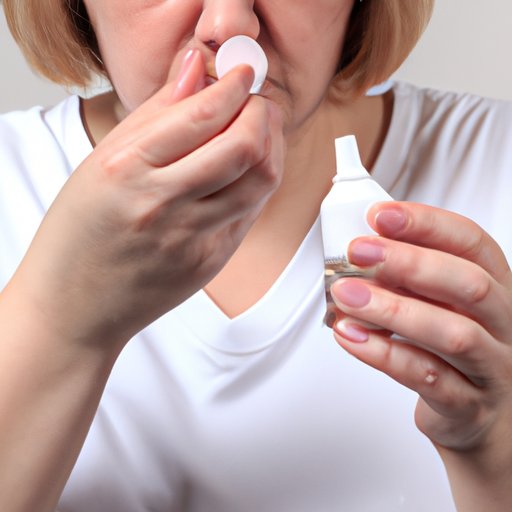
Introduction
Allergy medication refers to any medication designed to alleviate allergy symptoms, including antihistamines, decongestants, and corticosteroids. These drugs can help reduce sneezing, runny nose, itchy eyes, and other allergy symptoms. However, they can also cause side effects, such as drowsiness, dizziness, and dry mouth.
The purpose of this article is to provide you with a comprehensive look at the pros and cons of taking allergy medicine every day, how it affects your body, alternative methods for reducing allergies, and guidelines for safe usage.
Pros and Cons of Taking Allergy Medicine Every Day
One of the main advantages of taking allergy medicine every day is that it can help control symptoms on a consistent basis. This can improve your quality of life and make it easier to manage your allergies. Additionally, taking medication regularly may help prevent more severe allergy symptoms, such as anaphylaxis.
However, there are also potential disadvantages to daily use of allergy medication. One of the most significant is the risk of side effects. Depending on the type of medication you’re taking, you may experience drowsiness, dizziness, dry mouth, or other common side effects. In some cases, prolonged use of certain medications may also increase your risk of developing health problems, such as glaucoma or osteoporosis.
Before deciding whether to take allergy medication every day, it’s important to consider your individual situation. Factors that can influence your decision include the severity of your allergies, the types of medication available to you, and the potential risks and benefits of each option.
How Allergy Medicine Affects Your Body
Allergy medication interacts with your body in various ways. Some medications work by blocking histamine, a chemical that’s released by the immune system during an allergic reaction. Others work by reducing inflammation or narrowing blood vessels in the nose and throat.
While allergy medication can be effective in alleviating symptoms, prolonged use may increase your risk of developing health problems. For example, some antihistamines can cause drowsiness and impair your ability to drive or operate heavy machinery. Regular use of corticosteroids may increase your risk of developing osteoporosis, high blood pressure, or diabetes.
It’s important to consult with your healthcare provider before taking allergy medication every day to discuss the potential risks and benefits of each option.
Alternative Methods to Reduce Allergies
If you’re looking for an alternative to taking allergy medication every day, there are several natural remedies and lifestyle changes that may help reduce your symptoms. Some of these include:
- Eating a balanced and healthy diet
- Reducing stress through techniques like meditation and yoga
- Using a saline nasal rinse to clear mucus from your sinuses
- Using a HEPA air filter to minimize exposure to allergens
- Getting regular exercise to improve overall health and immune function
In addition to these options, there are also alternative treatment options, such as acupuncture and herbal supplements, that have shown promise in reducing allergy symptoms. These options may be particularly beneficial for people who don’t respond well to traditional allergy medication or who want to avoid the potential risks associated with daily medication use.
Managing Allergy Symptoms Without Medicine
If you want to manage your allergy symptoms without relying on medication, there are several steps you can take. First, it’s important to identify common allergens and triggers, such as pollen, dust mites, and pet dander. Once you know what you’re allergic to, you can take steps to minimize your exposure to these allergens.
Some effective ways to prevent allergen exposure include:
- Closing windows and doors to prevent pollen and other allergens from entering your home
- Using a HEPA air filter to reduce airborne allergens
- Cleaning your home regularly to remove dust, mold, and other allergens
- Washing your bedding and clothing frequently to remove allergens
- Avoiding exposure to allergens, such as pet dander, that you know you’re allergic to
If you still experience symptoms despite these efforts, there are also non-medical ways to alleviate allergy symptoms, such as using a Neti pot to irrigate your sinuses or using a humidifier to keep the air moist.
A Guide to Safe Allergy Medicine Use
If you do decide to take allergy medication every day, it’s important to follow safe usage guidelines to ensure that you’re getting the most benefit while minimizing your risk of side effects. Some tips to keep in mind include:
- Always read and follow the instructions on the label
- Take medication only as directed by your healthcare provider
- Store medication in a cool, dry, and secure location
- Dispose of medication properly, according to the instructions on the label or as directed by your healthcare provider
- Avoid taking medication with alcohol or other drugs that can interact with it
If you’re taking prescription medication, be sure to inform your healthcare provider of any other medications or supplements you’re taking to avoid potential drug interactions.
How to Wean Off Allergy Medicine Safely
If you decide you want to stop taking allergy medication, it’s important to do so gradually to avoid rebound symptoms or other health problems. This process, called weaning, involves gradually reducing your dosage over a period of several weeks or months until you’re no longer taking the medication.
It’s important to discuss weaning with your healthcare provider before starting the process. They can help you create a customized weaning plan based on your individual needs and provide guidance on when to seek medical assistance if necessary.
Conclusion
Overall, taking allergy medicine every day can be a viable option for managing allergy symptoms, but it’s important to weigh the potential benefits and risks of this approach. Alternative methods, such as natural remedies and lifestyle changes, may be effective in reducing your symptoms without the side effects associated with daily medication use. Regardless of the approach you choose, it’s important to follow safe usage guidelines and consult with your healthcare provider to ensure that you’re making an informed decision that’s right for you.




